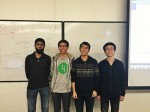In one week, four UCLA students will pack their bags for a trip to Morocco, prepared to huddle around a single computer at one of the most prestigious computer programming competitions in the world. They will tackle five hours of advanced computer coding and technical problem-solving, surrounded by piles of scratch paper and teams of college students from around the globe.
Team UCLA Blue is up to the challenge.
“Not only are the people here the best collegiate programmers, they tend to be the best in the world in general,” said Shahid Chohan, fourth-year computer science major and coach of Team Blue. “Within programming circles, there are celebrities. They’re the equivalents of Michael Jordans or Kobes at this competition.”
For the first time since 1989, UCLA will send a three-person team to the World Finals of the Association for Computing Machinery International Collegiate Programming Contest in Marrakech, Morocco. On May 20, more than 350 students from universities around the world will participate in the 39th annual event, which is sponsored by IBM. The grand prize is a $16,500 check.
UCLA’s ACM branch selected fourth-year computer science students Hao Chen and Xin Gao and recent graduate Chaoshuai Lu to represent the school this year. The trio placed second in the Southern California regional competition last November, earning a wild card spot in the World Finals.
The pressure on competition day is intense.
Teams of three receive problem sets containing eight to 10 story-based exercises, Chohan said. Teams must work together to analyze, prioritize and solve the puzzles. Problems can involve topics such as geometry, number theory and ad hoc programming, which requires team members to formulate new algorithms on the spot to solve a problem.
“(People) think, everyone’s just on their computers and doesn’t talk to anyone,” Chohan said. “There’s definitely a communication aspect that some people overlook.”
Chohan said teams can also have access to a printer while completing the tasks. Provided with one computer and one calculator, teams must coordinate who’s coding, who’s reading problems and who’s doing work on paper.
“It’s not just (about) individual programmers’ strength, but coordinating their shared access to one computer,” said David Smallberg, a computer science lecturer and faculty adviser for Team Blue. “It’s a challenge for every team. Every second, someone’s got to be productive.”
Chohan said a sample problem could pose the basic question of a road trip: Given a list of cities spaced various distances apart, in which order should one visit them? The team would classify the technique used to solve it – a traveling salesman graph theory problem, in this instance.
Gao rarely touches the computer during practice. As a fast thinker, his specialty lies in the computation of such problems and deciphering the mathematics hidden beneath their words. He verbally communicates his findings to Chen and Lu, who specialize in computer coding. Gao first got into programming in China when he was 15 years old after his computer teacher helped him with math homework, he said.
Chen said he thinks the competition this year is fierce.
“For Xin and me, we’re really happy to be able to go to World Finals and have the chance to meet (new) friends,” he said. “(But we’re also) nervous because there are a lot of talented teams.”
In competitions like ICPC, Chen estimates each given program could be about 50 to 200 lines; bigger programs could comprise perhaps 10,000 lines.
Chen, Gao and Lu practice every weekend to fine tune their teamwork, communication and computational skills. The team participates in online practice sessions with other schools, such as University of Chicago. Earlier this quarter, former ICPC champions from Russia also came to train ACM members for a week, Chohan said.
Smallberg said he thinks universities in Russia, China and eastern Europe have grown more competitive in recent years. He competed on UCLA’s team himself as a graduate student from 1981 to 1985, and still helps recruit students for the team.
Event organizers will provide live coverage of the competition, complete with progress updates and problem analyses partway through the period, Chohan said.
“It’s kind of like a sports event, like ESPN,” he said. “The most extreme nerdy version of it.”
The team leaves for Morocco on May 15.
